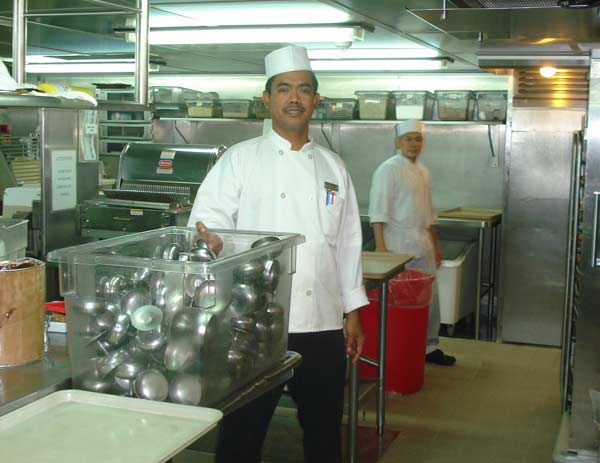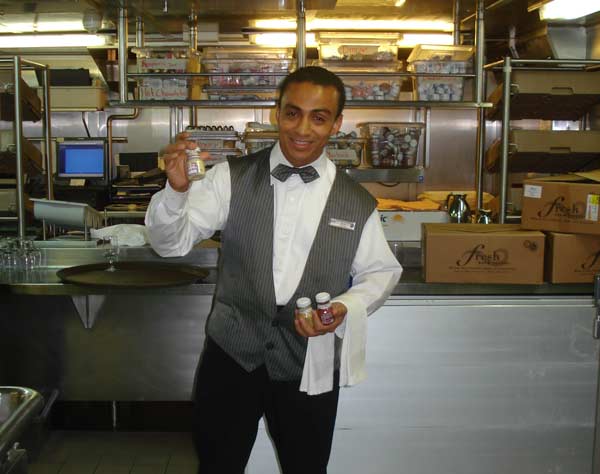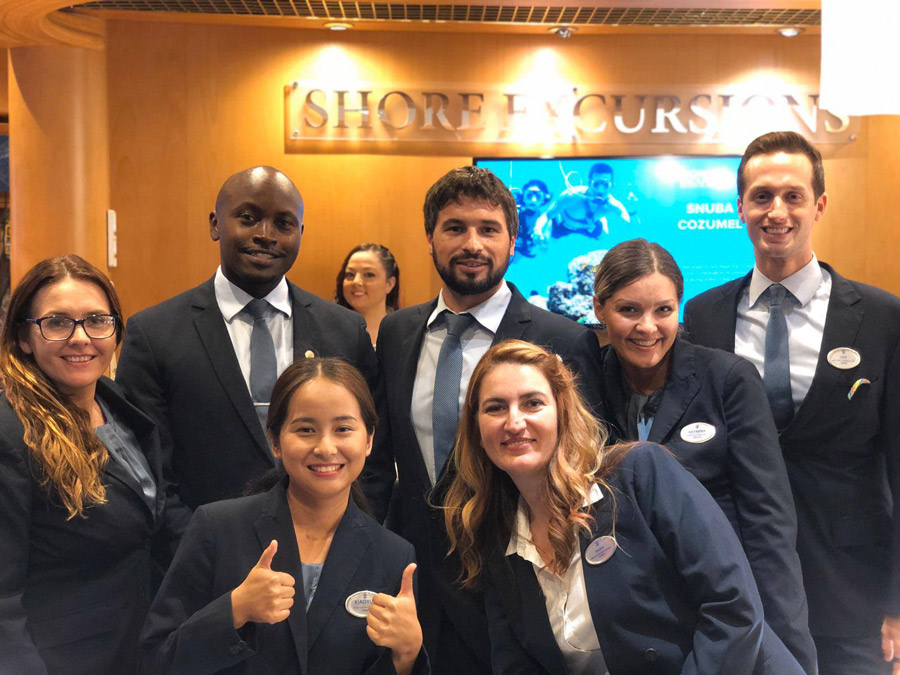Work on a cruise ship - the process of applying, interview, and how to choose the right job

Working on a cruise ship can be a great experience, but like everything has its advantages and disadvantages. If you're thinking about working on a cruise ship, you're in the right place. Since I worked on the cruiser itself, this text is here to inform you better in the story itself and how the process looks like before you start working onboard a cruise ship. The text covers the following topics:
- - How to choose a recruiting agency?
- - How to choose the right job for you?
- - How to write a CV?
- - What an interview looks like?
- - What are the expenses to go to work on a cruise ship?
- - How much money you can earn?
- - How long the contract lasts and can you can quit?
Agencies
If you are planning to go to work on a cruise ship, it is easiest to apply through an agency. there are many agencies working with cruise companies. Link to all agencies is on behalf of the agency. You can find the list of reqruiting agencies on this site but there are more out there.
As far as the cruise companies themselves are concerned, there are a lot of people. The first thing you need to know is that companies are organized into corporations. Companies in the same corporation have a similar business policy. Some of the largest corporations are:
Carnival Corporation, featuring Carnival Cruise line, Princess, Costa Cruise, Holland America. This corporation is the largest and achieves the highest profit in relation to others.
Royal Caribbean operateing Royal Caribbean Cruise Line, Celebrity Cruises and Azamara.
Norwegian Cruise Line Holdings, which includes Norwegian Cruise line, Regent Seven Seas and Oceania. I know the people who worked for this corporation and were generaly happy with the conditions.
These are the 3 largest corporations. There are more, but if you go to the ship, you will probably work for one of these companies.
Positions
On the ship, there is a big difference in working hours and benefits that can be used in relation to positions. The main division is crew, staff, and officer.
Crew positions
This includes all people working in a restaurant or F & B department. Then people who work in the kitchen ie the kitchen. These two departments are also the largest, with the largest number of employees. This includes a department at least, which is much smaller, but also has a crew status. This category includes housekeeping, although this job is not available in our offer. This is mainly done by people from Asia.

In the restaurant and kitchen, you have different positions, where the wages range from $ 500 to the top. But in relation to other departments, here you have the greatest chance of advancement precisely because there are many positions.
Usually, the crew works up to 13 hours each day. But as a crew, you do not have the right to eat in a restaurant where guests are eating, and food in the crew is always bad. Rooms are a bit worse, and two rooms share one bath.

My personal recommendation if you plan to work as a waiter is to apply for a bar, not a restaurant. The restaurant is much more pressing and is mostly longer working hours than at the bar. In the restaurant, you mainly teach types of food and wine, while in the bar you need knowledge about alcoholic beverages, and you know that you are making different coffee.
Staff positions
Staff positions include sales, reception, photographers, casino, spa, youth staff who are in charge of working with children, entertainment, includeing dancers, singers and people in charge of guest activities such as different quizzes, competitions, parties.

For all these department contracts are different than for crew positions. They have the right to use the restaurant that they use and guests. Rooms are a bit nicer and each room has its own bathroom. Their working hours are shorter. Whenever a ship is in the port they do not work. Someone from the department always has to remain in charge of emergency guest drills, but most can leave the ship, while people who are crew remain on board, even though they often have nothing to do.

I'm not saying that the staff is easier, every job on board is difficult. But the conditions are a bit better than when you arrive at the crew position. However, although some initial positions are almost the same, there are fewer opportunities for career advancement. Because there are simply fewer positions. And with the improvement, if, for example, you become a manager, the salary is lower than the main waitress in the restaurant.
My recommendation to girls is to apply for a staff position. For the first contract at least.
Officer positions
These include officers who must have completed a maritime school. They are mainly from Italy, the USA, Greece, and Croatia. This category also includes people involved in the administration, as well as those who train staff. These departments are also very small. They have even more benefits compared to staff positions.
How to write a CV?
The CV must be in English. It should look like a CV that you normally use. Basic information, education. For work experience, it is best to write what is most relevant to the position you are applying for.
It is not desirable to lie in a biography. Fake CVs are easy to break. But if you do not have any experience, you worked somewhere, for example. For 3 months at a local café or boutique/store, add another 3 months to your CV in general.
When writing a biography, you cannot write, for example, a waiter in that and that cafe from then and then. That's not enough. Because people who review your CV do not know how much the cafe / boutique you worked in, how much it is able to be crowded or not. You need to write down what you actually did there, such as making coffee, if you were doing the inventory, write inventory, work with guests. If you are selling, you should write the same thing, exactly what you did. It sounds better and your biography will look richer. One of the rules for a good CV is that it never has more than 2 sides.
The CV must be different from you and make it look better. Agencies and companies get a lot of biographies in just one day so your CV needs to look good.
What you need to keep in mind is that you will be asked to request two letters of recommendation from the agency. So you need to have at least two jobs from which you can get recommendations. The recommendations must be in English, have the signature and the seal of the company that gives it to you. It's possible that our people will hate writing you a recommendation, or they just will not know how to write it, as this is not a practice in our country. If this happens, you can find examples of recommendation letters on the net yourself, write something nice about yourself and just let them sign and give you a stamp.
Interview
A trial interview will be organized by the agency. To check your level of English knowledge and how realistic it is to get the position you want. They will check your product knowledge depending on the department you are applying, for example. Knowledge about cocktails (bar), different dishes (restaurant), or sales related if you apply for work in the store.
So even after you submit a CV and hear your phone, before you first see it live or through the skies, you should at least be ready.
After assessing your knowledge of English products and skills, it will tell you what you can expect and whether you are a candidate for the position you want. It will give you some guidance, what you need to fix and practice.
For the final interview, with people from the company, you will have additional preparation hours. On training, the agency will further teach you what you need to know about the company, about your position, what you need and what you should not say in the interview.
The interview itself does not last long. They ask you the questions that you have already prepared. What's your name, to say something about yourself, what you did. Then check your product knowledge related to your department.
What is the point of each interview is personality assessment. You will hear a million times that it is important that you are always smiling and inviting, which is true. If you are withdrawn and you have to swap words, you will probably not be interviewed. Practice with your friends an interview to get rid of the stammer.
2 to 7 days after the interview you can expect results. If you have gone from the agency will give you further guidance on how to apply for a visa and do a medical examination.
How much will it cost you to go to the ship?

Departure to the ship should not cost you more than 900 euros. Agency services should be free, as the agency receives a commission from the company from your contract. For spa this can be different. The one thing you pay to the agency is the English language test fee I paid for around 20e.
These costs are in fact after you've already got a job.
Visa costs - You will need an American transit visa. Visa costs are $ 160 and are paid in dinar equivalent. You will receive all instructions from the agency. The interview in the embassy is quite short and most likely you get a visa. It's not like applying for work and travel or a tourist visa. This visa is different, and it is easier to get.
Medical examination - examination lasts all day. In the morning you give blood and urine, and later during the day, you have a dentist, an eye doctor, an eye doctor, a lung surgery, a general physician review, and a gynecologist. A tetanus vaccine is obtained. The whole review is done privately, so everything goes fast. Medical examination costs between $ 150-250 depending of the country.
Airline tickets are mostly paid by the company. Again, there are different rules for spa, so you can get information about it in the agency.
How much money should you take - $ 100 a minimum, $ 300 maximum. Mandatory in dollars, not in euros. It's real that you do not have anywhere to spend money. You need to buy an internet that is $ 40, and if you spend money in the crew bar, you probably want.
Salary depending on your position.
If you are on a contract for any of the positions involving a top-ranked or commission paycheck it is obtained by cruise. So when one circle ends, for example, For a week, after that, you get a portion of the salary for that circle, and so after each crop. So you do not get a monthly salary after a week's cut, but a part of the salary that is proportional to the number of days the circle lasted. When you find out which boat you are going to check the plan of a boat trip, you may receive one part of the salary a week later .
If you are in a position where you do not get a higher salary, you will receive it once a month or twice a month divided into two roughly equal parts. If you are going to do a job that does not involve a bachelor, it's best to ask the agency when it gets paid, as this depends on the company.
How much money can you earn?
It depends on the position and the cruise ship you are working on. But roughly, surely you will earn more than $ 1,000 a month. If you are in the contract, for example, $ 600, and you have a position where you're on top, then your salary is actually double what you sign. Again it depends on the ship you go to, but it's mostly like that. For other positions such as sales and photographers, salaries are over $ 1,000, plus sales commission. For positions in the kitchen, salaries are over $ 1,000.
How long does the contract last?
The length of the contract depends on the state from which you are a state. For Europeans, irrespective of whether you are from a state that is in the European Union or not, the contract is 6 months, which is a day more. The same goes for people from South and North America and Africa. Contracts for Europeans can be longer, but approximately 6 months. It may happen that you are asked on board to stay longer, but this is your decision if you wish. For people who are from the Asian continent is a bit different, and their contracts last for 9 months.
You need to know that promotions, i.e. Improvement during the contract is almost impossible. I'm sure there are exceptions, but I did not hear about it. At the end of the contract, you get an assessment from your superiors in which they will write about their impression of you and what you did during the contract. If you have a good estimate, you can come to the next contract with a better position, i.e. You get promotion on paper.
Can you resign during your contract?
Yes. You can quit if you are 100% sure it is not for you and you will never return to the ship again. Do not give up after a week. Wait for the first two months to pass, and if after that, you can go badly to human resources and quit. If you give up, give a 30 day notice period. Take a month off but you pay your airplane ticket back to your country.

